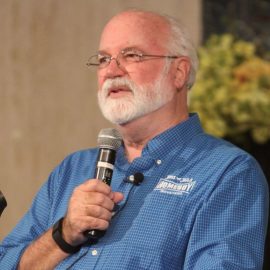

This article is an excerpt from the Shortform book guide to "Faith Still Moves Mountains" by Harris Faulkner. Shortform has the world's best summaries and analyses of books you should be reading.
Like this article? Sign up for a free trial here.
Have you ever felt like your faith was wavering? Do you wonder if God still performs miracles in our modern world?
Harris Faulkner’s Faith Still Moves Mountains explores how God responds to prayer and faith through real-life stories. This book showcases divine interventions that save lives, ease hardships, and strengthen relationships.
Continue reading to be inspired by tales of hope, perseverance, and the enduring power of faith.
Overview of Harris Faulkner’s Faith Still Moves Mountains
In our modern, more secular world, it can be easy to lose faith in the power of God. Fewer people than ever are religious, the world seems chaotic and without purpose, and for many people, God seems to remain silent. Despite this, journalist and television host Harris Faulkner knows God is watching out for everyone and throughout her life has seen how his power impacts people’s lives.
Harris Faulkner’s Faith Still Moves Mountains is full of real-life stories about how God responds to prayer and faith, directly and indirectly helping those in need. Faulkner explains that, by sharing people’s stories, she hopes to provide advice and comfort to people. This purpose informs both her career as a journalist and her decision to write Faith Still Moves Mountains. Our overview covers the three main themes of her stories: God saves lives, eases hardships, and strengthens relationships.
Part 1: God Saves Lives
Faulkner begins with stories of God intervening to save people’s lives. She describes this happening in two ways:
- God literally saves someone from death or serious danger.
- God figuratively saves someone who’s lost by providing them purpose or direction.
God Provides Safety
Faulkner explains that God can intervene to save people from death. Some of her stories involve incredible rescues from danger that were only possible because of a series of elaborate “coincidences” that were actually the work of God. Other stories explain how God answered prayers to heal the sick when conventional medicine failed.
For example, Earnestine Reese’s home was almost entirely destroyed by a tornado—the only thing left standing was her prayer closet. Earnestine was in the bathroom during the storm and was buried under rubble, but she and her children survived. Earnestine attributes the miraculous survival of both herself and her prayer closet to the power of God at work.
God Provides Direction
In addition, Faulkner describes how God can provide direction to those who feel lost or out of options due to depression, grief, trauma, or some other obstacle. Sometimes he does this directly, speaking to a person or giving them an idea or gut intuition. Other times, faith in God indirectly provides people with purpose—by inspiring them to become clergy or missionaries or to dedicate themselves to worship and charity in some other way.
For example, Faulkner recounts the story of Sarah Olson and her medical device company Levity Products. Olson’s son Levi had to use a catheter because of a medical condition, but conventional catheters caused him intense pain and discomfort. Feeling lost and out of options, Olson prayed for a solution—and suddenly received divine inspiration for a new and improved catheter design. She used this design to help ease her child’s pain and also founded a company to sell it to other people in need. This provided her with a new purpose in life.
Part 2: God Eases Hardships
Faulkner also suggests God can help people through the most challenging parts of their lives—chronic disease, poverty, the loss of loved ones, and so on. Faulkner’s stories describe God easing hardships in two main ways:
- God’s love is a source of comfort and peace during hard times.
- God can help people solve their problems or otherwise end their hardships.
God Provides Peace
Faulkner suggests that during hard times, God provides a sense of comfort and certainty—the knowledge that even during our lowest points, he is still present and still loves everyone. This gives peace from the turmoil and the strength to keep fighting even when things look bleak. Some people also find peace in knowing that no matter what happens, it’s all according to God’s plan.
Questioning Faith in Hard Times
In some instances, hardship can cause faith to be a source of uncertainty instead of peace—people may wonder why God is allowing their suffering to continue, feel anger toward him, or wonder if there is a God at all. Faulkner suggests that doubt isn’t uncommon or even wrong, noting that even Jesus struggled with the same questions during his darkest moments. What matters, she argues, is persevering despite your doubts, recognizing small victories and subtle signs of God’s grace.
In one of Faulkner’s stories, pastor Andrew Brunson was accused of spying and became a political prisoner in Turkey for years following the country’s failed 2016 coup. During his imprisonment, he endured harsh conditions and struggled with what he believed was God’s silence while he suffered. Once he was released, however, Brunson realized that struggling with faith while in prison was common and that God hadn’t actually been silent. Instead, he’d offered Brunson the strength to get through his imprisonment without giving up on God entirely.
God Provides Solutions
God can also ease hardship by providing solutions to people’s problems, Faulkner explains. Several of her stories describe how answered prayers either ended hardships altogether or offered people a path to solve them.
For example, Faulkner tells the story of the “prayer warriors” of the Bible College of Wales during World War II. This small group of students and clergymen dedicated themselves to praying hours every day for the downfall of Adolf Hitler and the Nazi regime throughout the war. Faulkner says the power of their faith and prayer influenced several of Hitler’s errors during the war, like his decision to abandon his offensive against a devastated Britain in 1940 to invade the Soviet Union.
Part 3: God Strengthens Relationships
Finally, Faulkner shows how God and faith bring people closer together in two ways:
- God helps communities come together.
- God helps friends and family grow closer.
Community Relationships
Faulkner’s stories show that faith strengthens ties by encouraging people to come together as a community. In contexts like a church service, Bible study, or prayer group, people can connect over their shared faith or pray toward a common goal. In addition, faith often drives people to help others through charitable acts and other good deeds, forging new ties and building community.
For example, Faulkner tells a story of a woman named Lisa Martin, whose family and friends came together to pray for her recovery when she came down with an extremely serious case of Covid-19. Lisa’s husband Jeff describes how many distant friends and family members reached out as a show of support or to offer him advice on how best to navigate the health care system. Lisa eventually recovered, in no small part because of their collective faith, prayer, and communal support.
Personal Relationships
Faulkner also tells stories of how faith in God can strengthen personal ties, allowing family and friends to grow closer. Several of her stories detail friends, family, and neighbors coming together to pray for a specific outcome—someone overcoming their intense depression, for example—and supporting one another, getting closer in the process. Christian faith also teaches the power and importance of forgiveness. This can help people forgive friends and family who harmed them in the past, allowing them to grow close once again.
For example, Faulkner tells the story of Nancy, who was abused by her alcoholic mother as a child. Finding Jesus and learning about God’s universal love helped Nancy recover from her traumatic past. Then, Nancy was able to recognize that her mother’s own trauma had influenced her behavior. Nancy forgave her mother, praying she would also discover God’s love and be healed. Many years later, Nancy’s mother did exactly that.

———End of Preview———
Like what you just read? Read the rest of the world's best book summary and analysis of Harris Faulkner's "Faith Still Moves Mountains" at Shortform.
Here's what you'll find in our full Faith Still Moves Mountains summary:
- Real-life stories about how God responds to prayer and faith
- How faith can impact people’s lives in miraculous ways
- Why God still matters in our modern, more secular world






